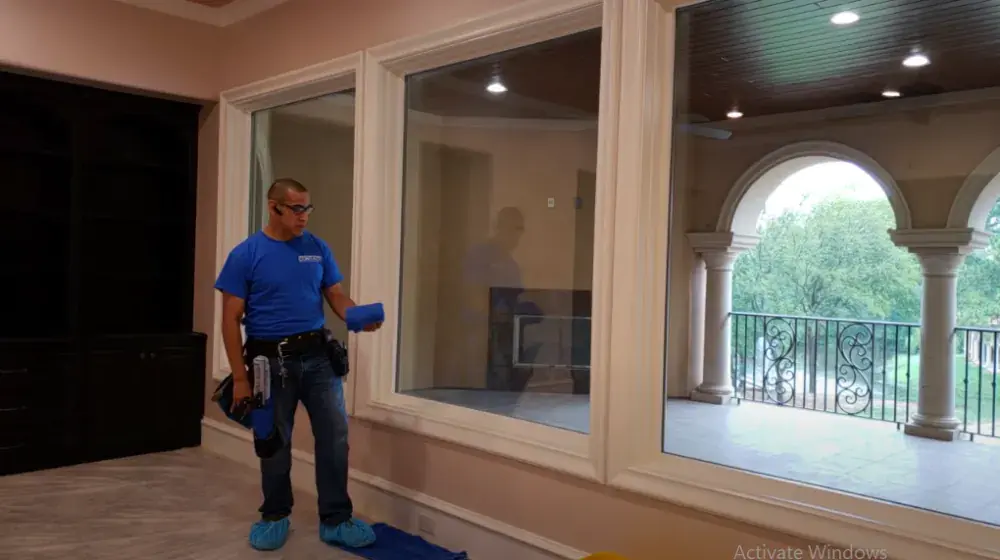What Are The Causes of Window Damage?
Window damage can be caused by various factors, including weather conditions, improper installation, accidents, and aging. These factors can lead to cracks, chips, broken glass, foggy or cloudy appearance, and difficulty in opening or closing windows.
Aside from compromising the aesthetics of a property, window damage can also affect energy efficiency, security, and overall comfort. It is important to address window damage promptly to prevent further deterioration and ensure the longevity of windows. Regular maintenance, proper installation, and choosing high-quality materials can help mitigate the risk of window damage and prolong their lifespan.
Understanding the causes of window damage can help homeowners and property managers take appropriate measures to protect their windows and maintain their functionality.
Old Age
Windows can suffer damage from various sources, and one common cause is old age. Over time, windows go through wear and tear that can lead to material degradation. This can result in several issues that compromise the functionality and appearance of the windows.
Wear And Tear
Wear and tear occurs due to prolonged use and exposure to environmental elements, leading to damage such as cracks, chips, and scratches on the window surface. This can affect the structural integrity of the window, making it prone to further damage.
Material Degradation
As windows age, the materials used in their construction may degrade, leading to issues like warping, discoloration, or loss of insulation properties. For instance, wooden windows may experience rotting or decay, while metal frames can corrode over time.
Weather Elements
Window damage is caused by various weather elements such as extreme heat, heavy rain, strong winds, and hailstorms. These factors can weaken the structure, crack the glass, or cause leaks, leading to costly repairs or replacements. Protecting windows with proper maintenance and preventive measures can help minimize the risk of damage.

Extreme Temperatures
Extreme temperatures can have a significant impact on the condition of your windows. When it comes to hot weather, the intense heat can cause the glass to expand, putting additional pressure on the window frame. Over time, this repeated expansion and contraction can weaken the structure, leading to cracks or even shattered glass. On the other hand, cold temperatures can cause the glass to contract, potentially causing gaps or leaks around the window seals.
Moisture And Humidity
Moisture and humidity are common culprits behind window damage. When moisture seeps into the framework, it can lead to a range of problems, such as rot, mold, and mildew. These issues not only compromise the functionality and appearance of your windows but can also pose significant health risks to you and your family. In regions with high humidity levels, the excess moisture in the air can cause condensation to form on the windows, leading to water damage and potential mold growth if not addressed promptly.
Heavy Rain And Storms
Heavy rain and storms can wreak havoc on your windows, especially if they are already compromised. The force of heavy rain and strong winds can penetrate weak spots in the window seal, allowing water to seep into your home. This water infiltration can lead to water stains, mold growth, and even structural damage. Additionally, if your windows are not properly secured, strong winds from storms can cause them to rattle, potentially leading to cracks or shattered glass.
Wind And Uv Rays
Exposure to wind and UV rays can gradually deteriorate your windows over time. Strong winds can carry debris and cause it to scrape against the glass, resulting in scratches or chips. On the other hand, UV rays from the sun can cause fading and discoloration of your window frames and furniture near the windows. This can be a concern, especially if you have expensive curtains or furniture that you want to protect. Additionally, prolonged exposure to UV rays can weaken the window seals, making your windows more susceptible to moisture infiltration and other forms of damage.
It is important to understand the various weather elements that can cause damage to your windows. Extreme temperatures, moisture and humidity, heavy rain and storms, as well as wind and UV rays, can all impact the condition and longevity of your windows. By being aware of these potential causes, you can take the necessary steps to protect and maintain your windows effectively.
Poor Maintenance
A major cause of window damage is poor maintenance. Neglecting regular cleaning, sealing, and repairs can lead to various issues that can damage windows and compromise their functionality.
Lack Of Cleaning
One common cause of window damage is a lack of regular cleaning. When windows are not cleaned regularly, dirt, debris, and other substances can accumulate on the surface. Over time, this buildup can corrode the glass and frames, ultimately leading to damage. Additionally, dirty windows can hinder the amount of natural light that enters the space, making it feel gloomy and dampening the overall ambiance of the room.
Neglected Repairs
Another consequence of poor maintenance is neglected repairs. When minor window issues such as cracked glass or malfunctioning hardware are overlooked, they can escalate into more significant problems. For example, a small crack in the glass can gradually worsen over time, leading to a complete window replacement. Similarly, failing to address faulty hardware can result in difficulty opening and closing the windows, compromising security, and reducing their lifespan.
It’s crucial to prioritize regular cleaning, sealing, and repairs to prevent window damage and maintain their longevity. By incorporating these maintenance practices into your routine, you can ensure that your windows remain in optimal condition, enhancing the appearance, comfort, and efficiency of your space.
Accidental Damage
Accidental damage to windows can occur due to a variety of reasons. It is important to understand the potential causes to take preventive measures and ensure the safety and security of your property. Here are some common causes of accidental damage to windows:
Impact From Objects
Objects such as tree branches, flying debris during storms, or even stray balls from a game can impact and damage windows. This type of accidental damage often results in cracks, chips, or shattered glass, compromising the integrity of the window.
Vandalism Or Property Crime
Vandalism and property crime, including acts such as graffiti, deliberate striking of windows, or attempts to break into a property, can cause significant damage to windows. These malicious acts can lead to broken glass, scratches, and other forms of damage that require prompt attention and repair.
Incorrect Installation
Incorrect installation can lead to window damage due to issues like air and water leakage, reduced energy efficiency, and potential structural damage. Poor fitting, improper sealing, and inadequate support can all contribute to such problems, emphasizing the importance of professional and precise installation practices.
Incorrect installation can significantly contribute to window damage. Improper measurements and inadequate sealing are two common issues that can arise during the installation process.
Improper Measurements
When windows are not measured accurately, it can lead to a host of problems. The wrong-sized windows may not fit properly in the opening, causing gaps or uneven edges. As a result, air and moisture can seep in through these gaps, compromising the energy efficiency of your home and potentially causing water damage.
Moreover, improper measurements can also impact the functionality of the windows. If they are too small, they may not provide adequate ventilation or access to natural light. On the other hand, windows that are too large may be challenging to open, close, or even lock securely.
To prevent these problems, it is essential to hire professionals who have the expertise to take accurate measurements. They will ensure that the windows fit perfectly, creating a tight seal to keep out unwanted elements and maintain optimal performance.
Inadequate Sealing
Inadequate sealing is another significant cause of window damage. When windows are not properly sealed during installation, it can lead to multiple issues that can be detrimental to your home.
Insufficient sealing allows air to escape and enter freely, compromising the energy efficiency of your home. This can lead to increased heating and cooling costs as your HVAC system works harder to maintain the desired temperature. Additionally, drafts from improperly sealed windows can make your living spaces uncomfortable, leading to hot or cold spots and inconsistent temperature regulation.
Furthermore, inadequate sealing can allow moisture to penetrate through the windows. Over time, this moisture can lead to water damage, rot, mold growth, and even structural issues if left unaddressed. Moisture accumulation can also cause condensation on the inside of the windows, obstructing your view and potentially damaging window frames and sills.
To prevent these problems, professional installers ensure that windows are properly sealed using high-quality materials. This includes utilizing appropriate weather-stripping, caulking, and sealants to create a barrier against air and moisture infiltration. Proper sealing not only protects your windows but also enhances energy efficiency, indoor comfort, and overall home durability.
Frequently Asked Questions For What Are The Causes Of Window Damage?
Window damage can occur due to extreme weather conditions, such as storms or hurricanes. Other causes include improper installation, aging, and lack of regular maintenance. Cracks, leaks, and rotting frames are signs of window damage that should be addressed promptly to prevent further issues.
Improper installation can result in gaps and air leaks around the window frame, leading to energy loss and water infiltration. This can cause moisture damage, rotting of the window frame, and increased vulnerability to weather elements. Proper installation by a professional is essential to avoid such issues.
Regular maintenance helps identify and address potential issues before they become major problems. Cleaning the windows, checking for cracks, and inspecting the frames for signs of rot or decay can prevent further damage. Regular maintenance ensures that windows remain functional, energy-efficient, and aesthetically pleasing for a longer period.
Conclusion
In conclusion, understanding the causes of window damage is the first step towards ensuring the longevity and functionality of your windows. Regular maintenance, appropriate material choices, and proactive measures can go a long way in protecting your investment and maintaining the clarity of your Dublin views. Shiny Bright Windows is here to assist you in keeping your windows pristine, so you can enjoy the beauty of the world beyond your panes for years to come.
Our Latest Articles
Read Now
Guide to Professional Window Cleaning in Dublin
Guide to Professional Window Cleaning in Dublin Welcome to Shiny Bright Windows, your trusted partner…
Who Is The Best Window Cleaning Company in Dublin?
Who Is The Best Window Cleaning Company in Dublin? Shiny Bright Windows is the best…
Best Practices for Power Washing Driveways in Dublin
Best Practices for Power Washing Driveways in Dublin Power washing driveways is an effective way…

